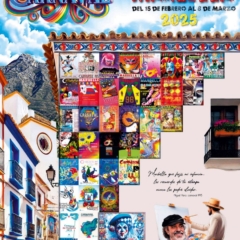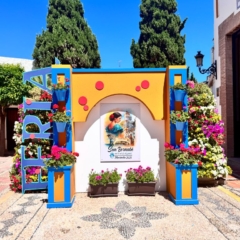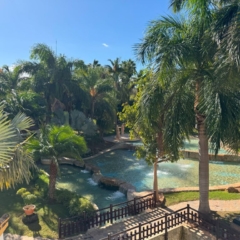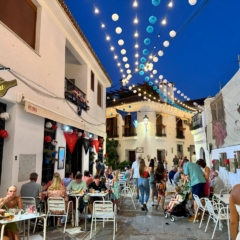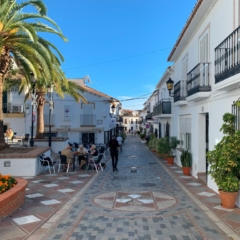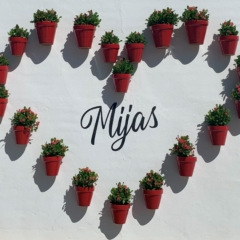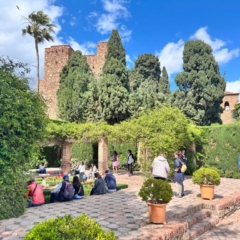Walking by Marbella Old Town
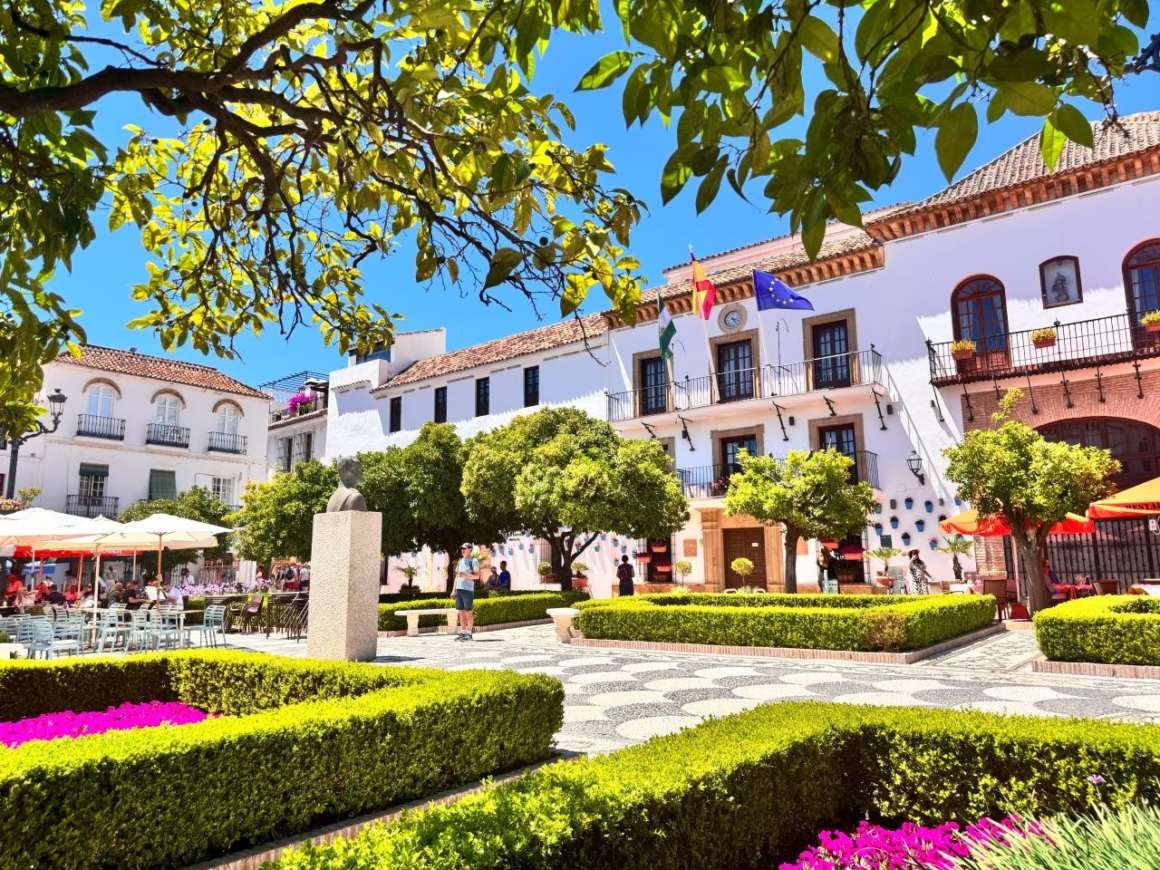
Some days are too gorgeous to just stay home. One of those days, with a extra-impressive blue sky and not a single cloud around, I decided I needed a special place to visit; somewhere I don’t go so often and where colorful spring flowers would shine… That’s how I ended up visiting Marbella Old Town, a trip I had been planning for months!
Places to visit in (or near) Marbella Old Town
I knew exactly what buses to get and what I wanted to see; I also knew it was going to be a large trip, as getting to Marbella from Benalmadena with public transportation takes close to two hours. The whole adventure took about 6 hours and was well worth it: it was more beautiful than I anticipated; I saw surreal colors and sculptures, 2 parks, one beach, medieval buildings and lots of bougainvilleas; I got so luck that I even found a cheese fair I didn’t know was happening!
Come with me to see the beautiful historic city center of Marbella, also known as Marbella Old Town. I’ll share my maps, pictures and itinerary so you can pick and choose what you’ll visit. 😉 The places visited in this post are marked below, in red – so you know where to find them; you can also access the list on google Maps by right-clicking the map below and opening it on a new tab.
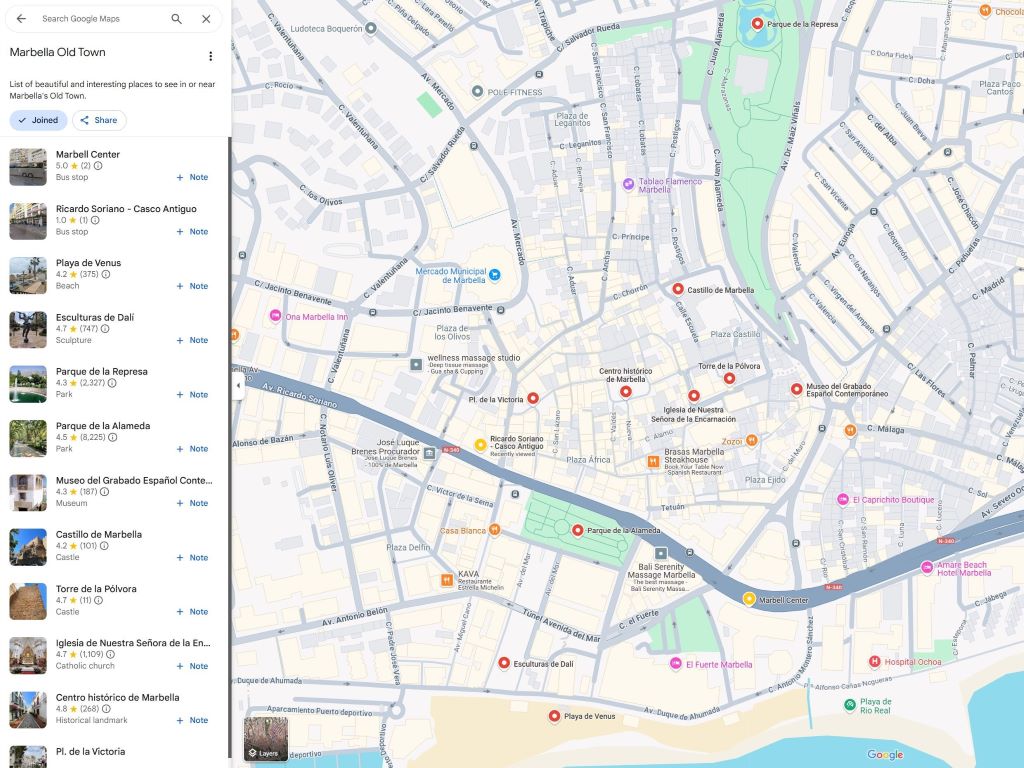
Parque de la Alameda
A stone’s throw away from Ricardo Soriano bus stop, the Parque de la Alameda is before anything, a great idea. A lush, dense, green area that is an unexpected oasis in a busy and fast paced part of Marbella.
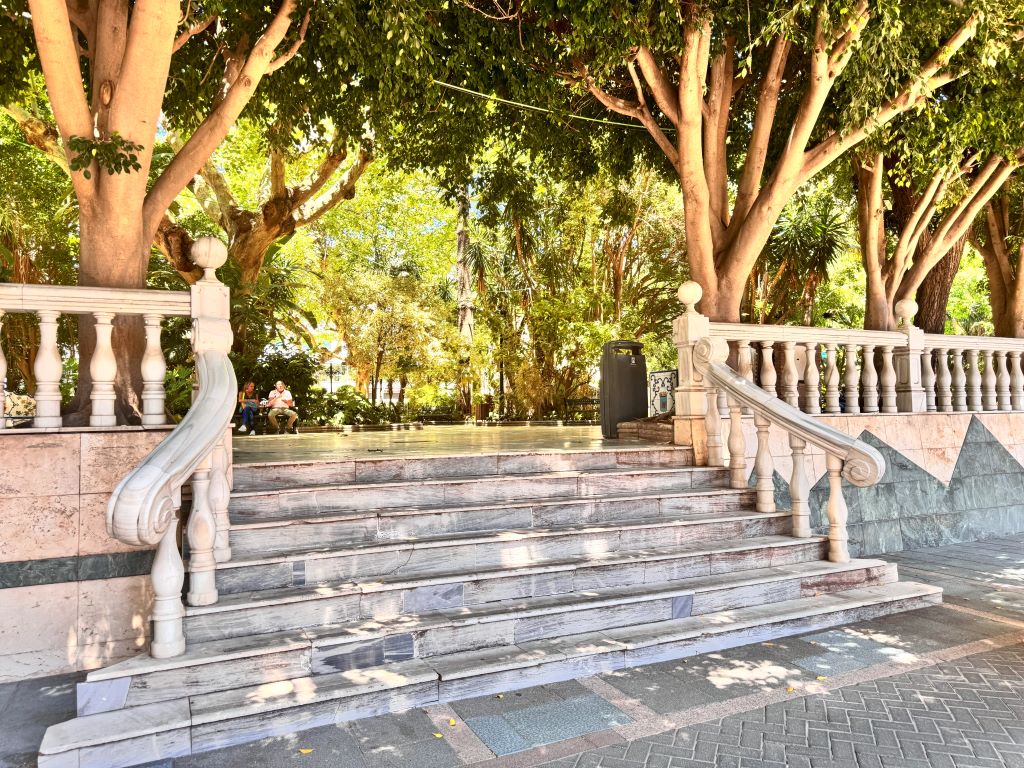
The park is small, surrounded by modern buildings and sided by a large avenue; still, as soon as you wander in, it feels as if we were in a magic forest. The canopy of the trees creates shade while filtering light and sounds; all we hear are birds, moving leaves and the water from the fountains; all we see is green.
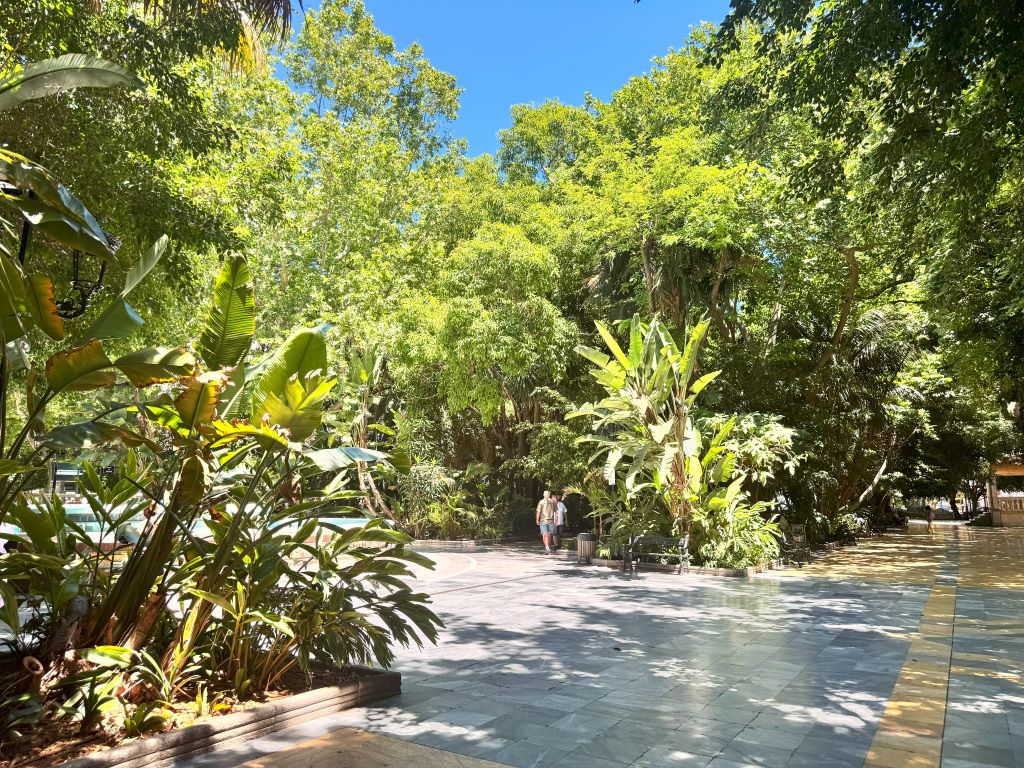
It does feel a bit as if time stops the moment we set foot into the park. This luxury of a place is more than 200 years old; the tiled benches reinforce the sensation that we have just traveled in time.
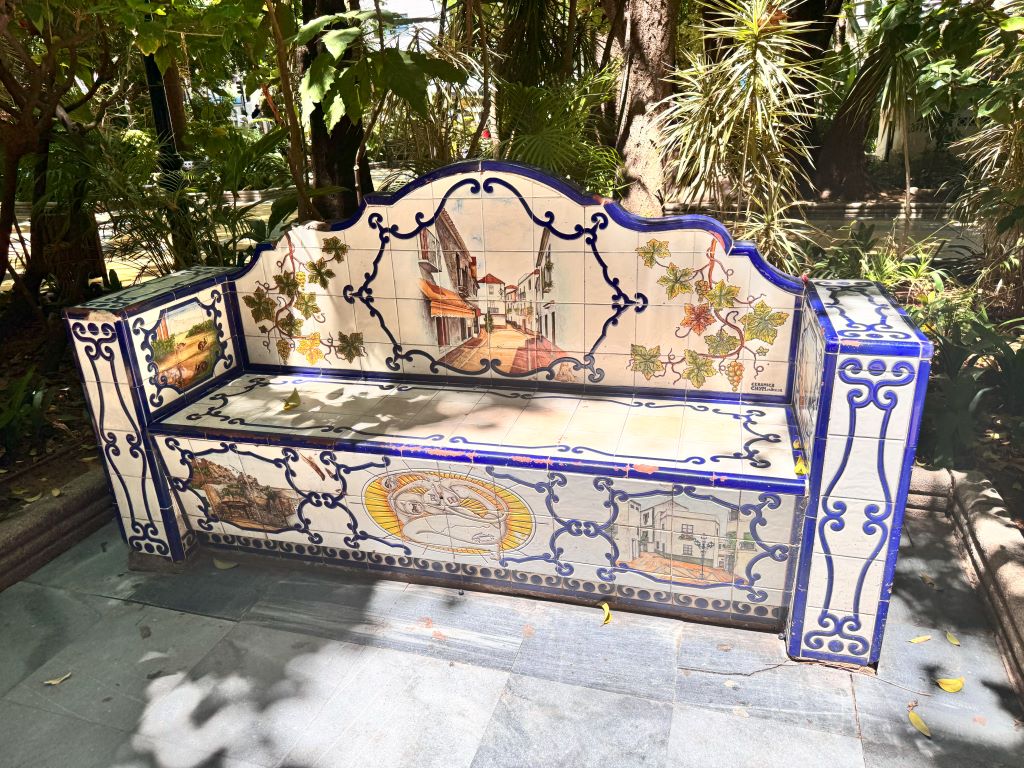
The park includes two fountains, one of which was working the day I visited:
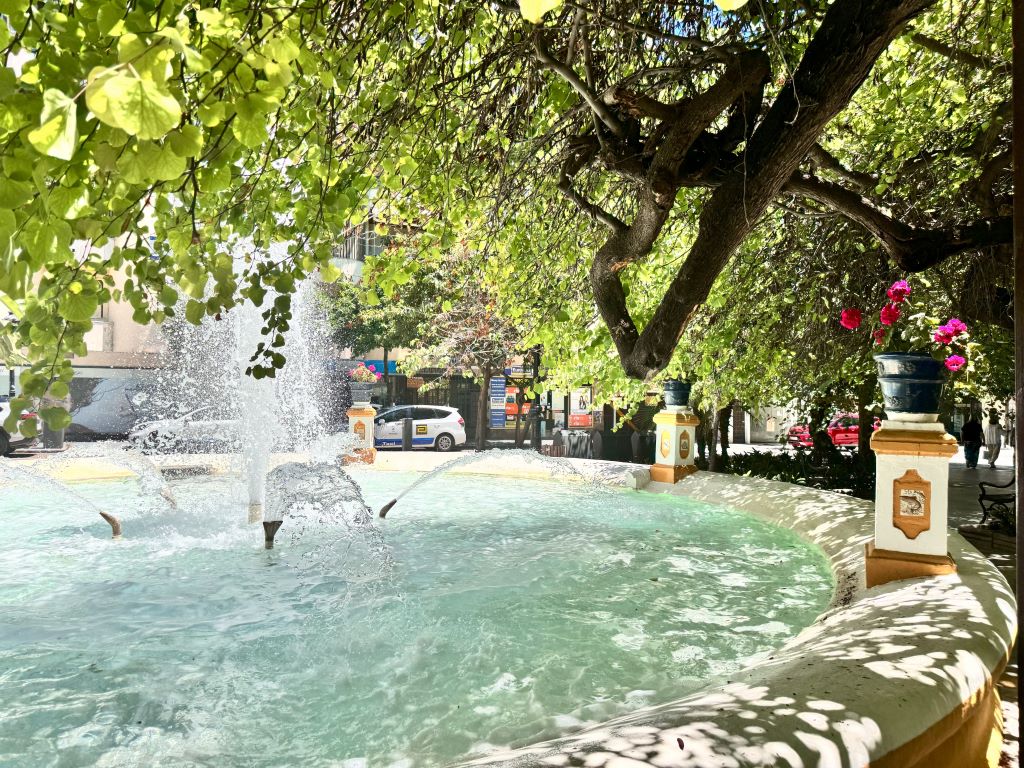
The Parque de la Alameda is a very pleasing place, an easy must visit to rest legs and senses after a lot of sight-seeing. Or right at the beginning of a trip as well!
Salvador Dalí Sculptures in Avenida del Mar
Just across Parque de la Alameda we find the Avenida del Mar, a walk-only street-turned-square that has a permanent exhibition of Dalí sculptures.
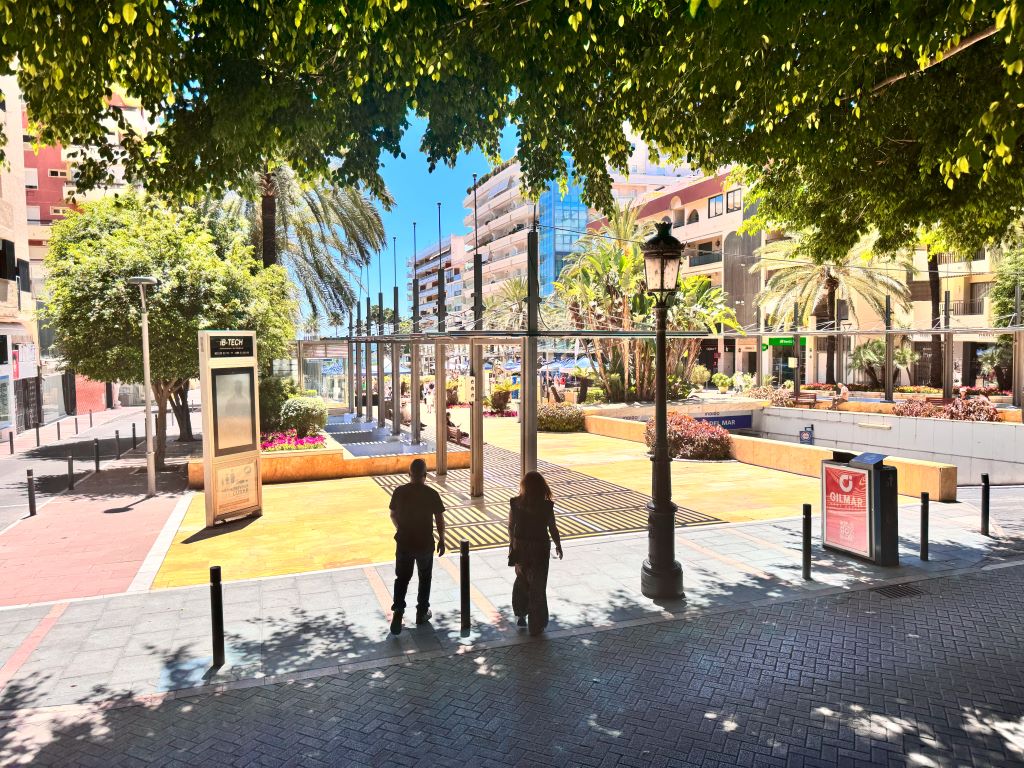
It just so happened that there was a cheese fair – Quesarte – going on the day I was there; so, besides sculptures, you’ll see quite a few stalls on the image below. Good to know where to look for fairs, right?
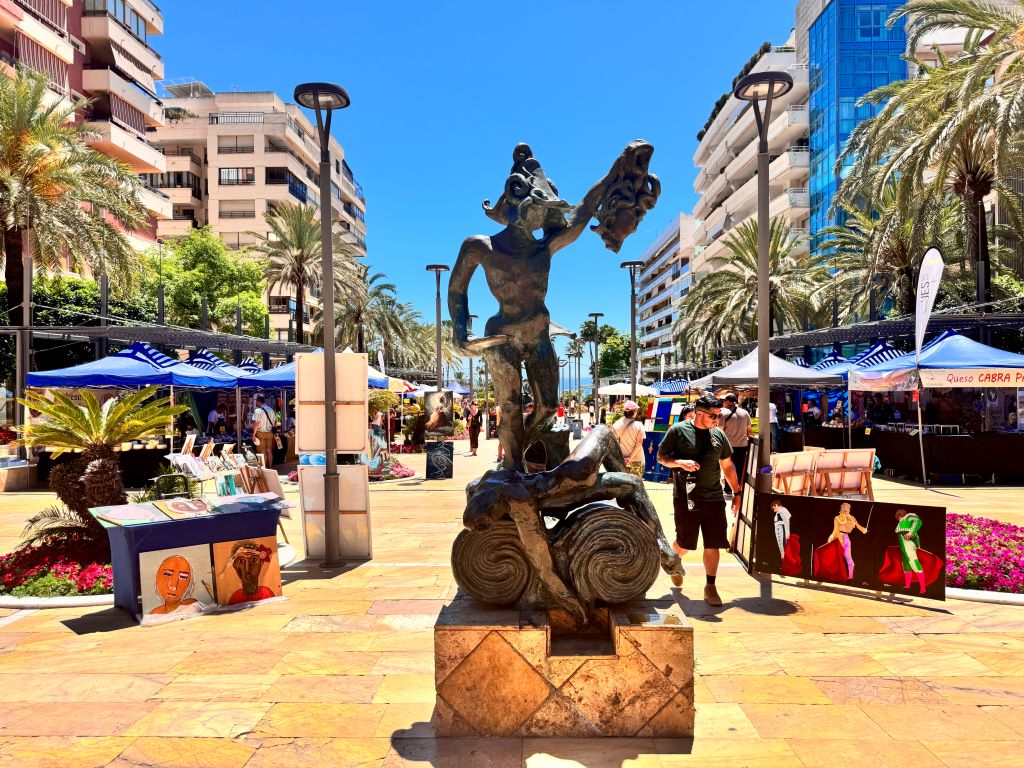
The sculptures were installed in 1998 and form a line along the street; there are benches on the sides of the avenue / square and some shade. The Avenida del Mar goes from the Parque de la Alameda all the way to the coastal promenade.
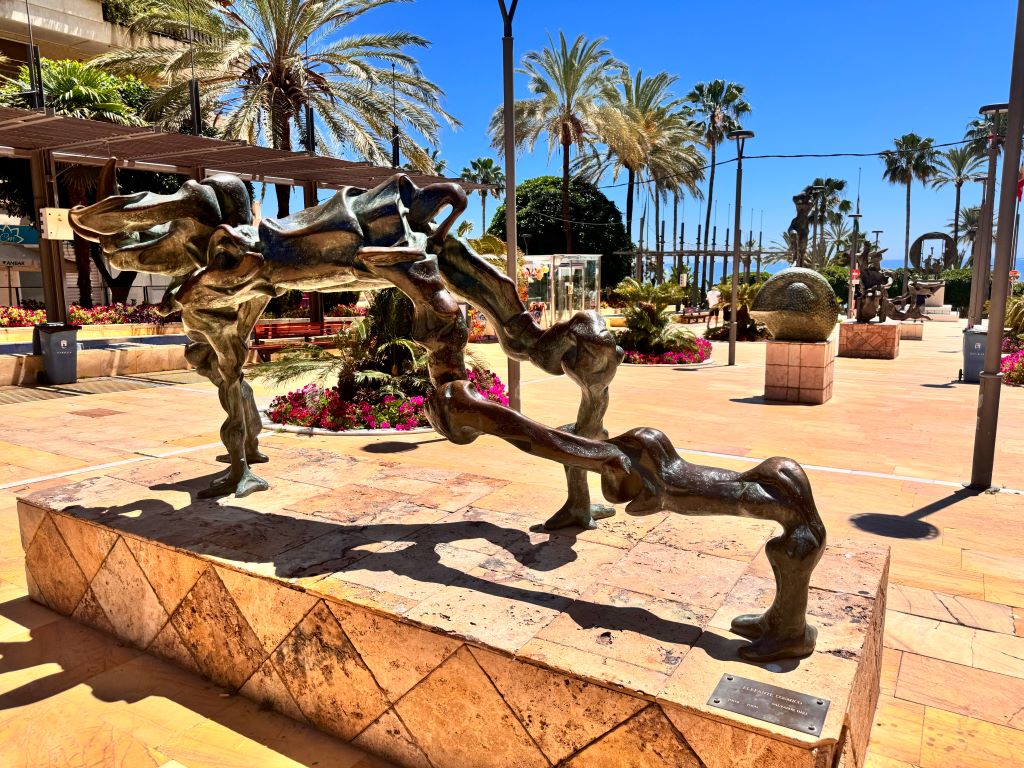
Needless to say, Avenida del Mar is one of Marbella’s postcards.
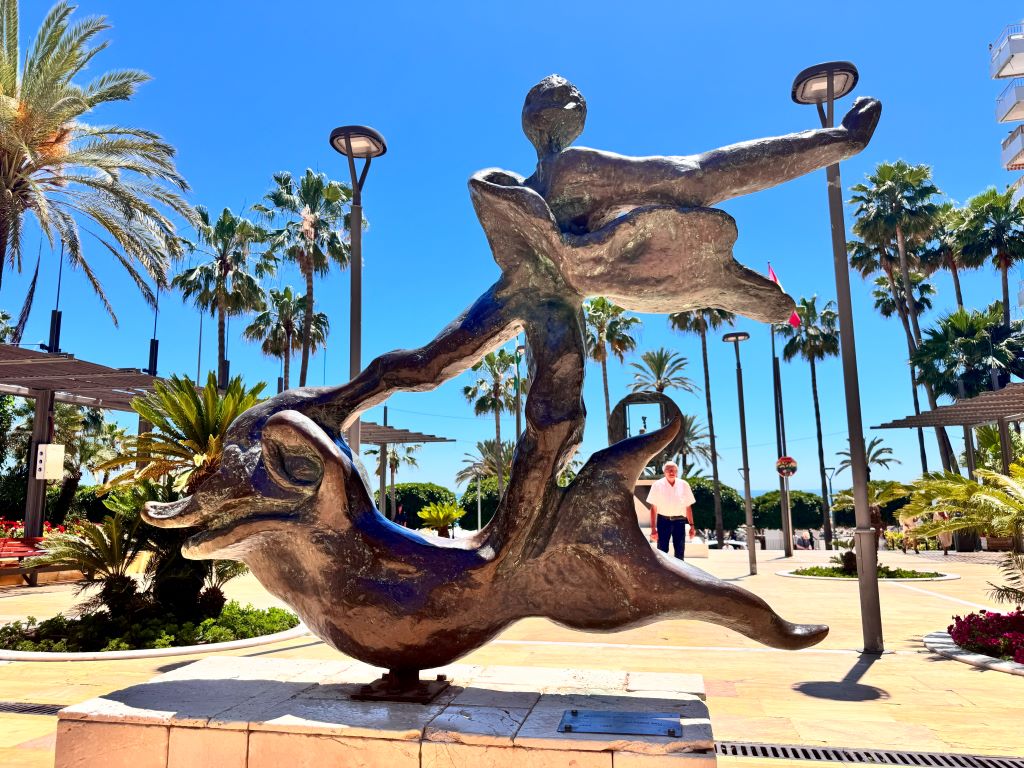
Venus Beach (Playa de Venus)
As happens in much of the Costa del Sol and in other popular places around the world, part of Marbella’s promenade is taken by street vendors. I think it is a shame; besides selling obviously counterfeit goods, they take up a lot of space, blocking an area that is meant for walking. Nevertheless, if you can see beyond that, Venus beach and Marbella’s promenade are quite nice.
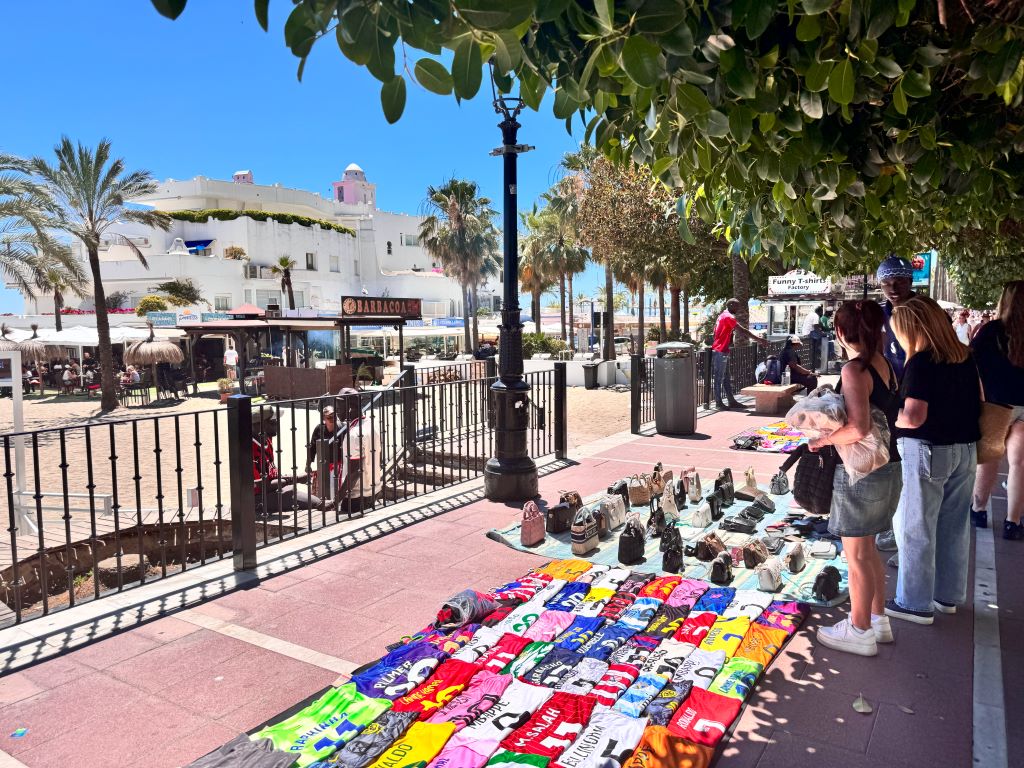
Venus beach has sand and a good infrastructure: there are bathrooms, showers, lifeguards and restaurants, a playground and plenty of chairs and umbrellas to rent (they cost about 10 euros per person for a day).

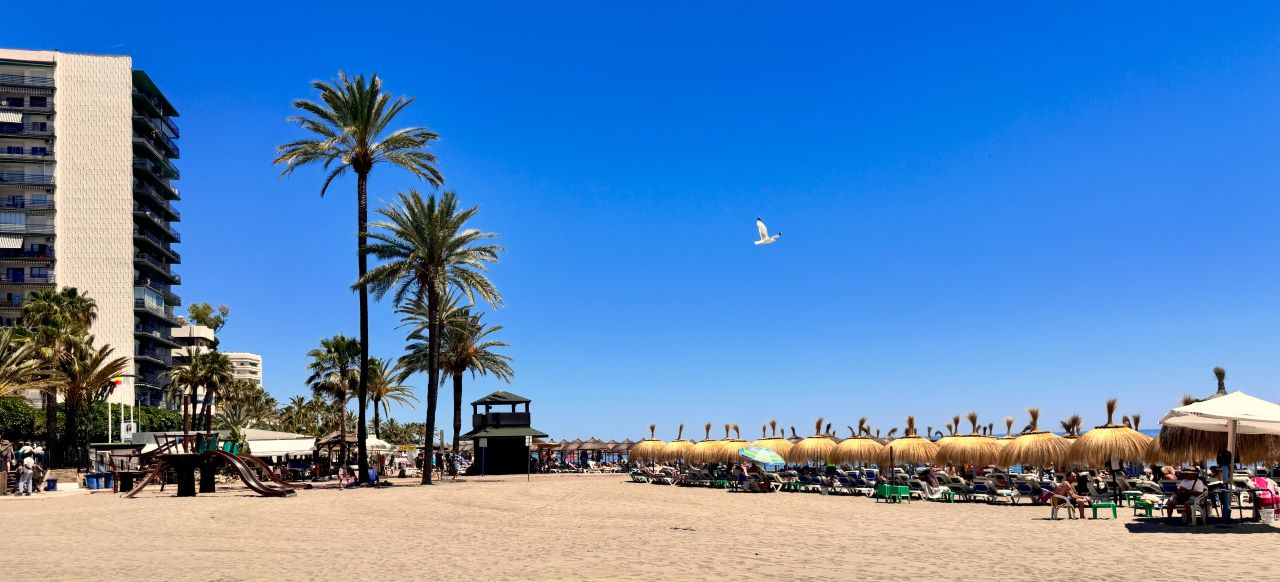
Having seen a bit of the modern side of Marbella, now it’s time to head to the Old Town. It is hard to believe how close it is; a very short walk from the beach, across Avenida Ricardo Soriano and we are in the Old Town; a few steps in and there we find the Plaza de la Victoria.
Plaza de la Victoria

The Plaza de la Victoria is a small but very cute square you’ll find while walking around Marbella’s Old Town. It has a fountain in the middle, but what really stands out are the strong colors: the bright purple of the Jacarandas in May, the pink flowers and the very blue sky contrasting with the white houses.
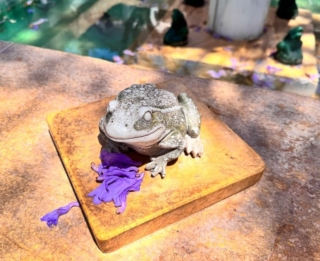
Marbella is made with a lot of mimo (a Spanish expression that means care, but more specifically the care for every small detail, as in the dedication towards making more than just the necessary). Little frogs by the fountain, small flower baskets on the lamps… pure mimo.
Plaza de los Naranjos
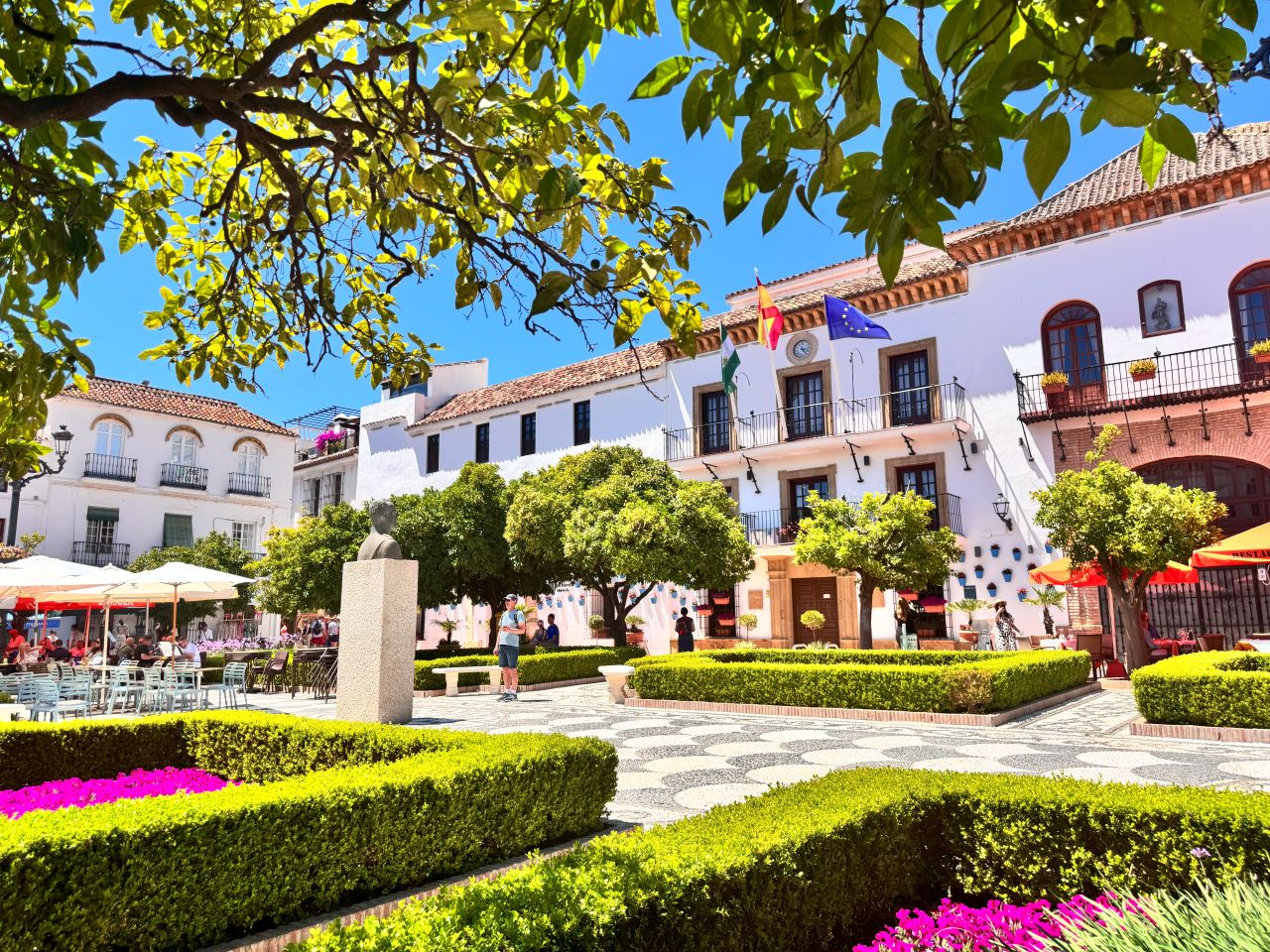
By far the most famous square in Marbella, the Plaza de los Naranjos is almost synonym of Marbella. It is a small – but manicured – square in the heart of the Old Town where we find the Town Hall and where events often take place – the Feria in June, Christmas, often have activities in the Plaza de los Naranjos.
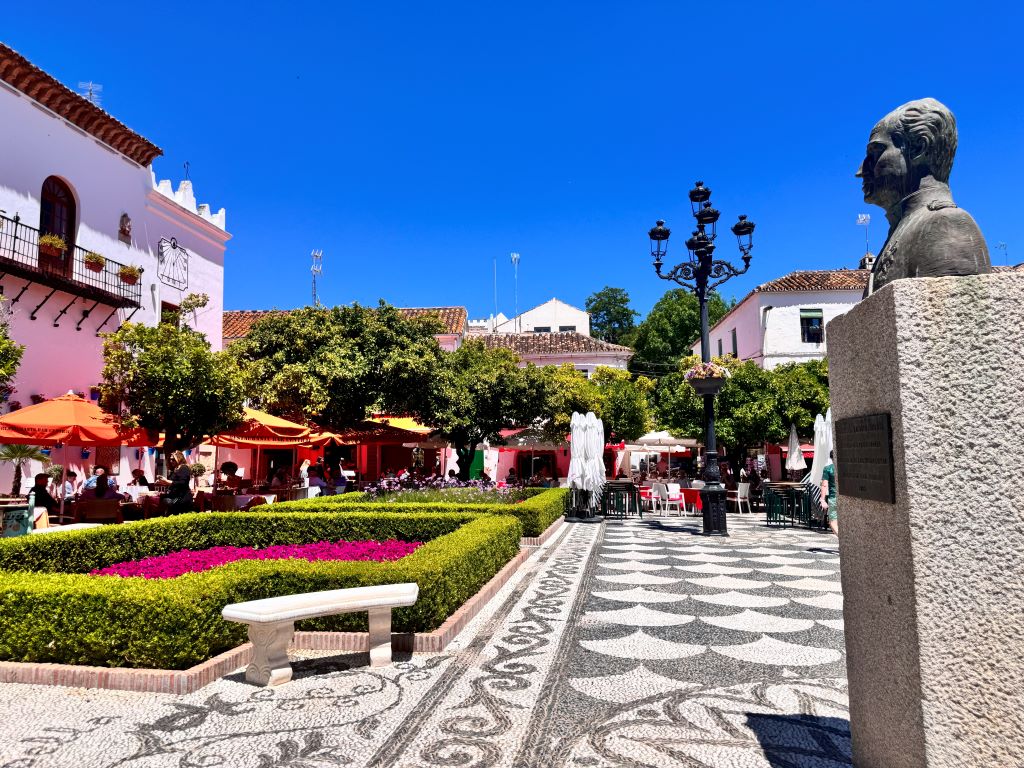
When not having a special event, the Plaza de los Naranjos is still full of people enjoying the many bars and restaurants that side the square. Slow paced life at its best, with a light breeze.

As the Plaza de los Naranjos sits in the middle of Marbella Old Town, there are several streets, both narrow and wide, that can be explored from here. It is a great place from where to walk around as you’ll be surprised every few meters with cute Andalusian-style plant pots on the walls and gorgeous bouganvilleas.
Extra: Marbella Old Town inner streets and squares
While walking around Marbella Old Town, I passed by several cute streets and squares that I think are worth mentioning here. Here are a few of them, for your delight (or treasure hunt, if you want to find them on the map!)
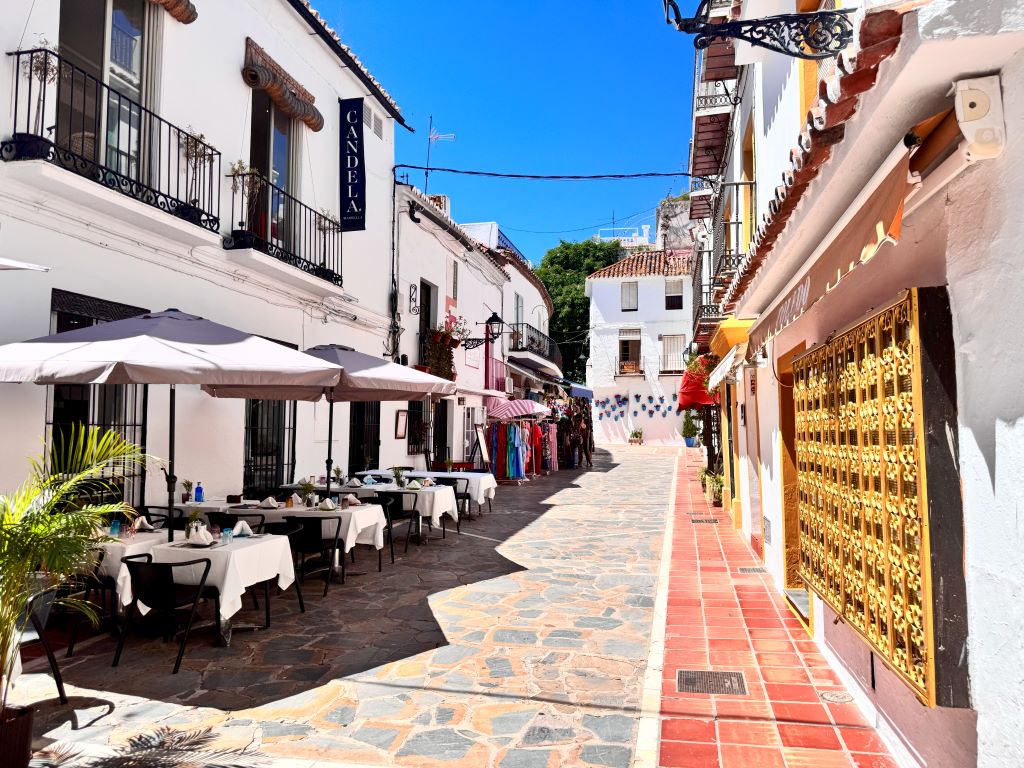
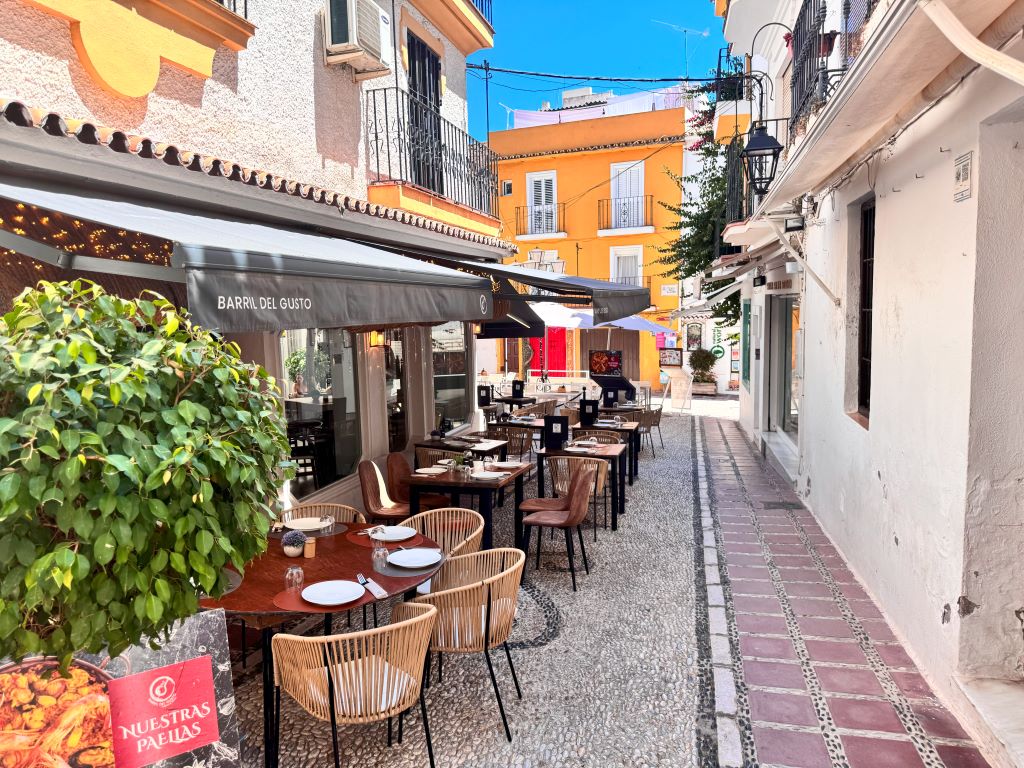
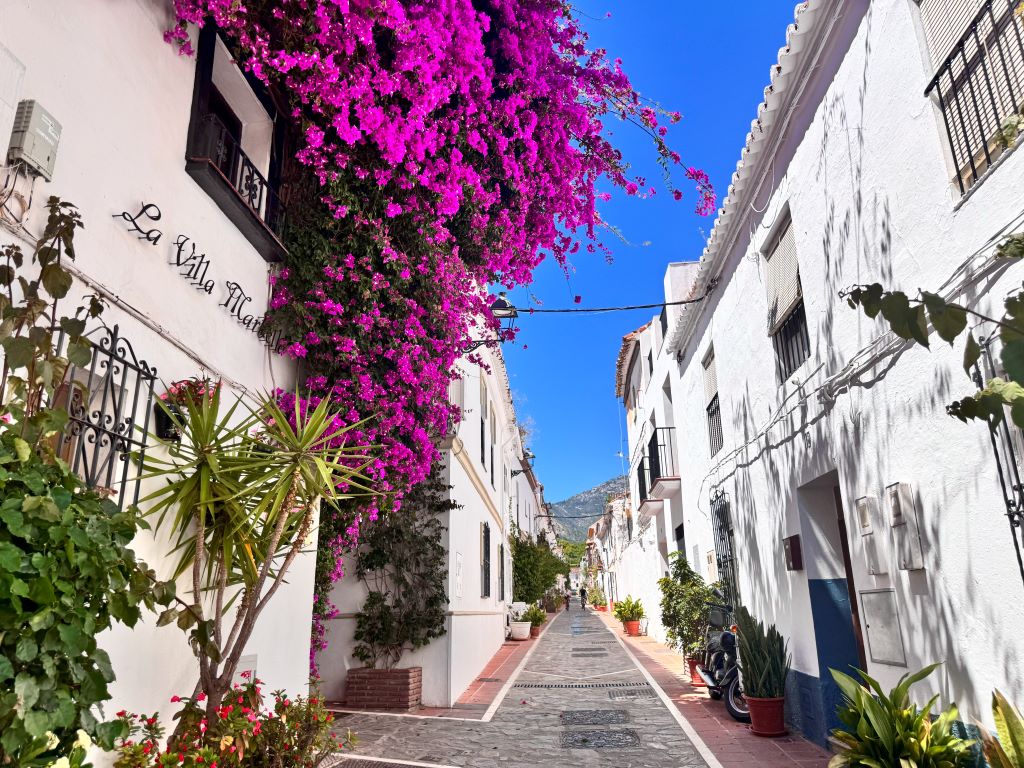

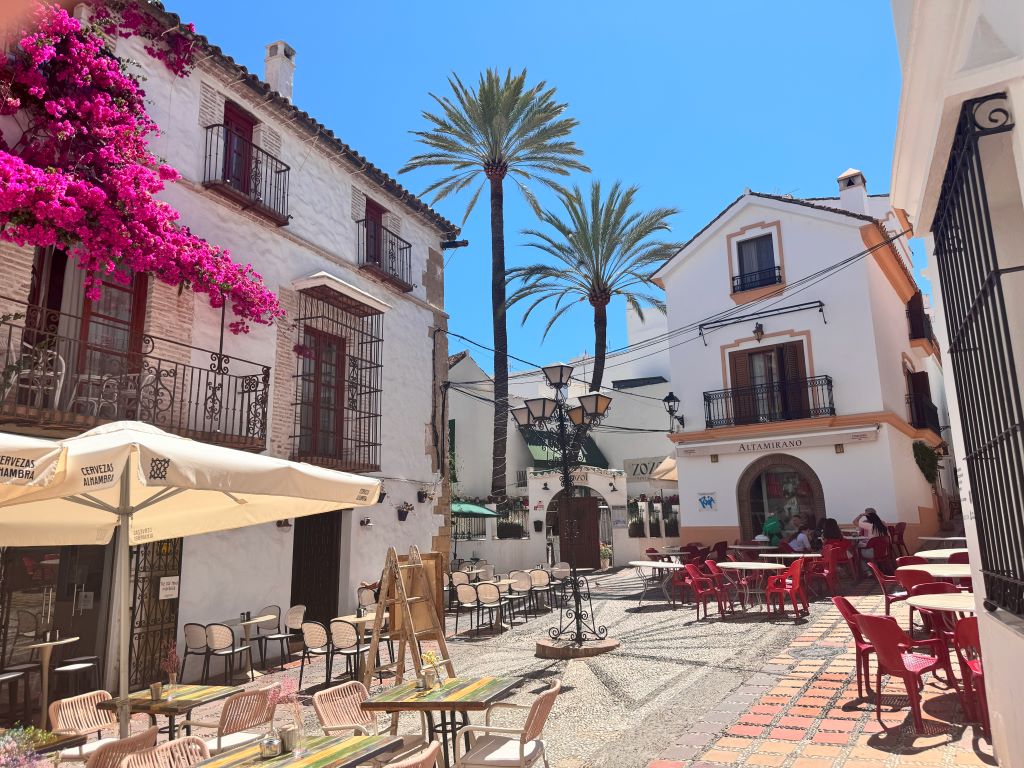
Iglesia de la Encarnación
Back to our route! Very close to the Plaza de los Naranjos we find Marbella’s main church, the Iglesia de Santa María de la Encarnación. It is quite a big church that dates back to 1618 (at least), has its own blog and I’m surprised it is not a cathedral – it certainly looks like one!
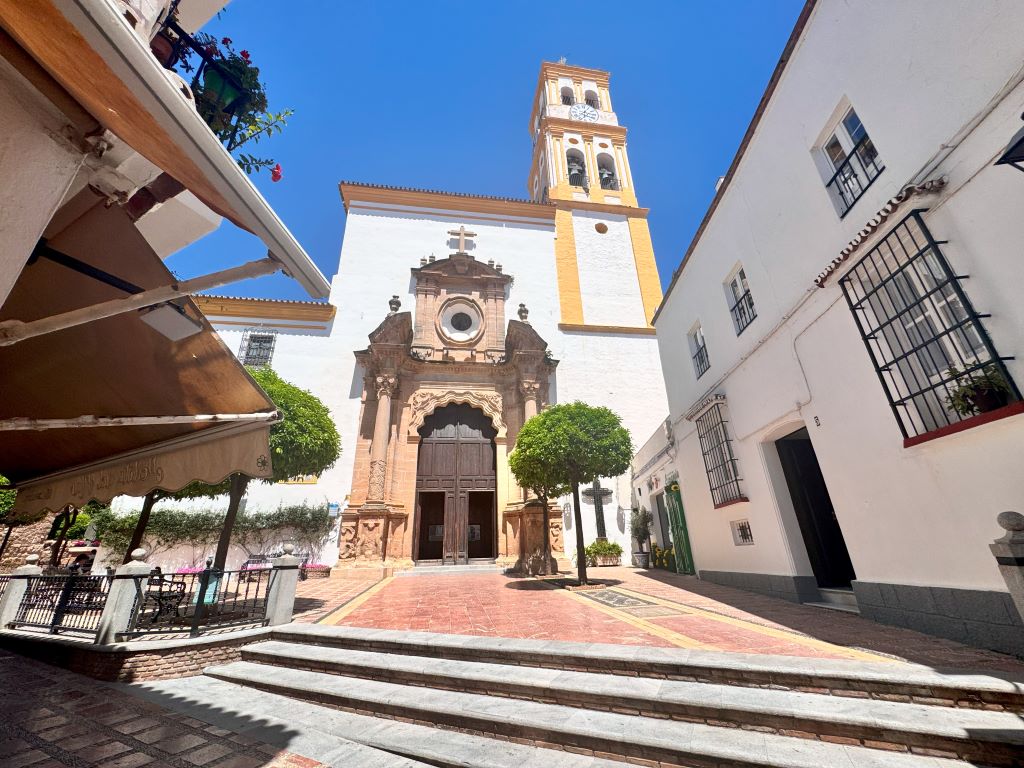
It is possible to attend mass or to just go visit the Church, but it is organized – there are different hours for each of these activities, which you can find here. The Church of the Incarnation also hosts Choir and Organ concerts through the year, particularly close to special dates of the Catholic calendar. If you are visiting Marbella close to Holy Week, Corpus Christi or Christmas, you are likely to be able to watch a concert there. 😉
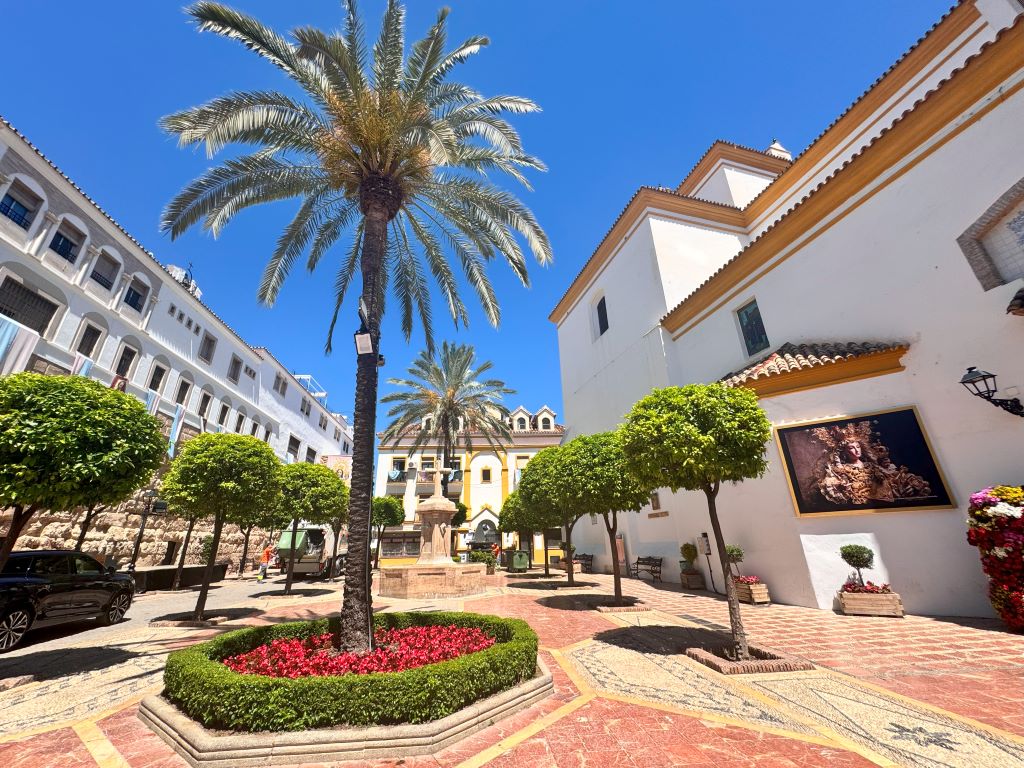
In the Church Square you can rest and enjoy the views of the Old Town. This square has a few restaurants and is less busy than the Plaza de los Naranjos.
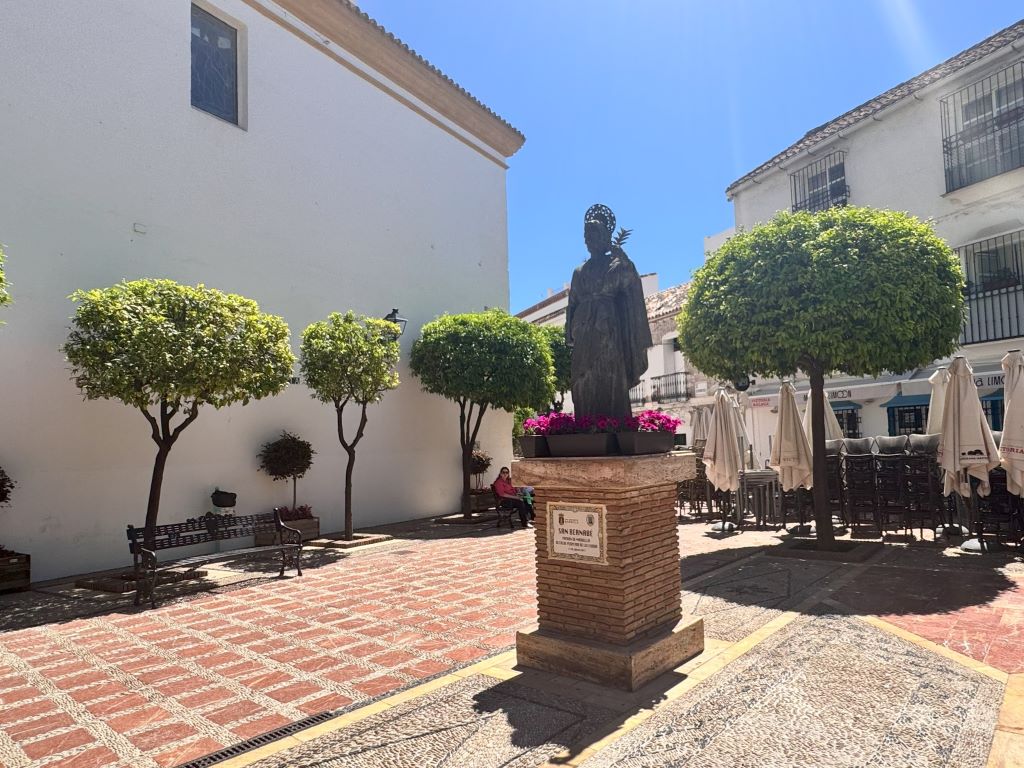
Extra 2: Fair poster
Talking about San Bernabé, we already have poster and dates for 2025’s Feria de San Bernabé in Marbella!! It will happen from June 09 to June 15, and if you want to take a picture with the poster, you’ll find it on the corner of Calle Trinidad and Calle Salinas!
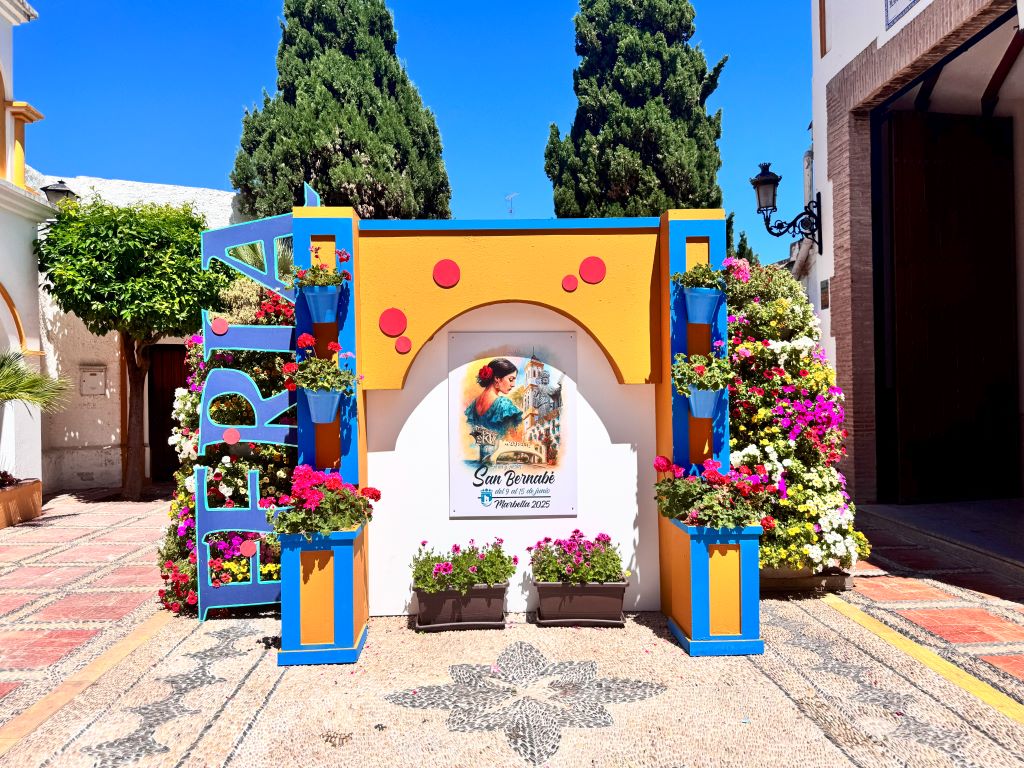
Walls of the Old Castle and Gunpowder Tower
In Marbella’s distant Moors past, the town had a castle surrounded by a wall and dotted with defensive towers. Part of this history is preserved in the Old Town, and you find it along Trinidad, Salinas, Arte and Portada streets.
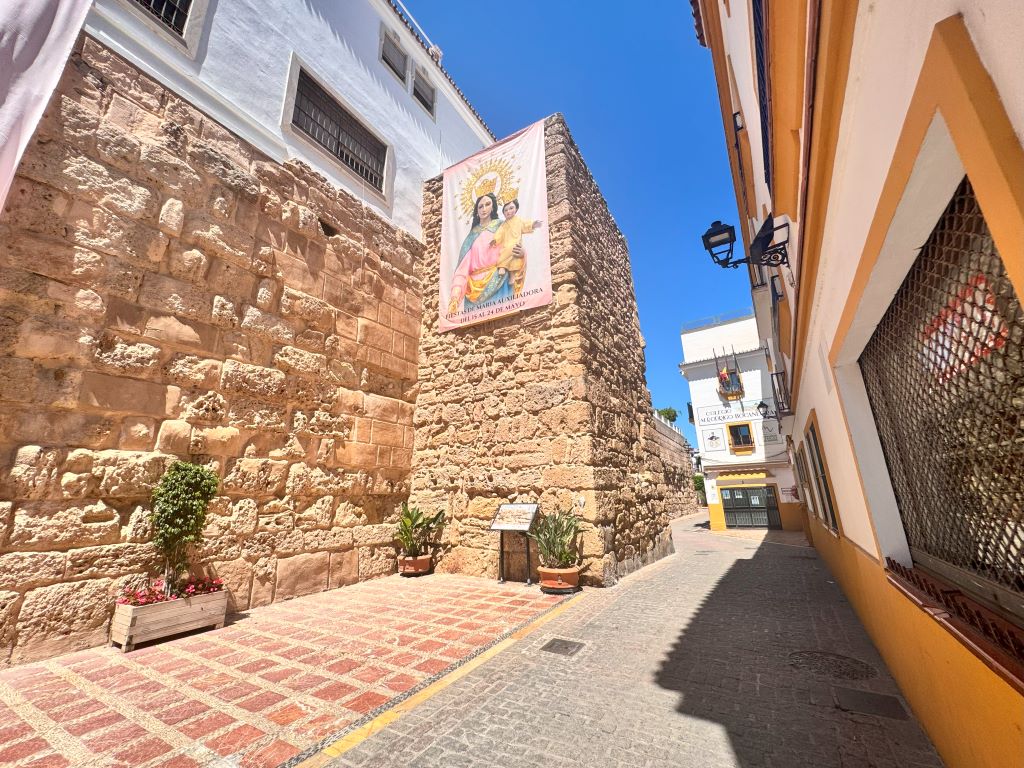
The Moors used part of the materials left by the previous occupants – the Romans – to build their own defensive system, much like they did in the Alcazaba of Malaga. The walls and towers are believed to be from the 10th Century.
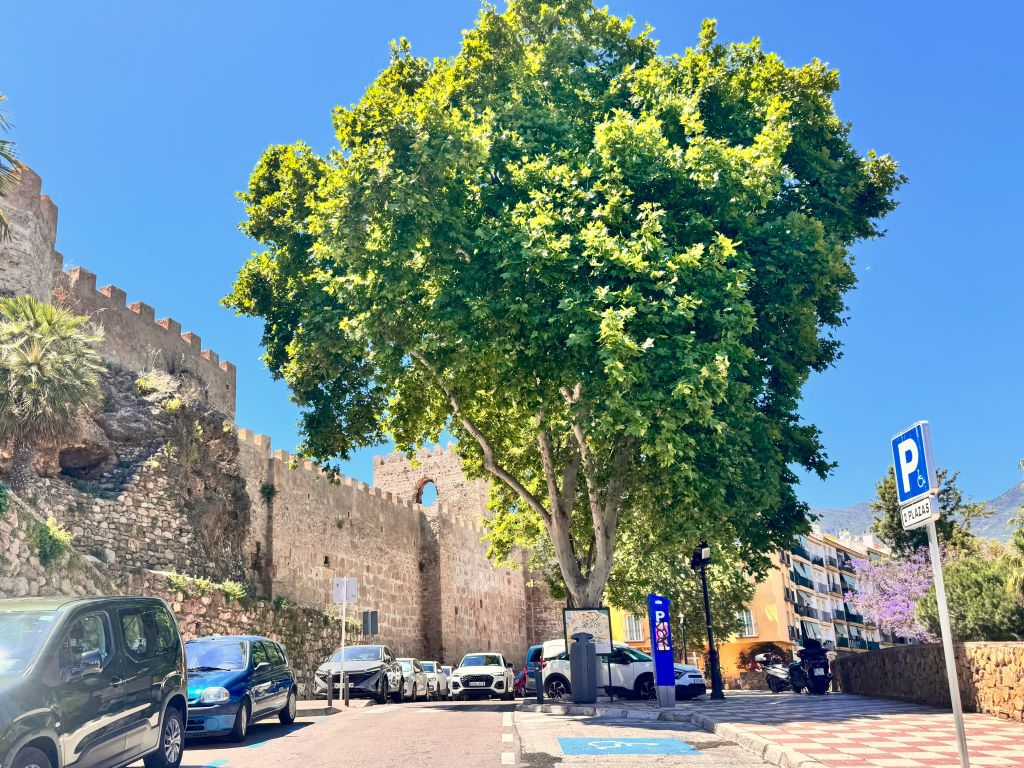
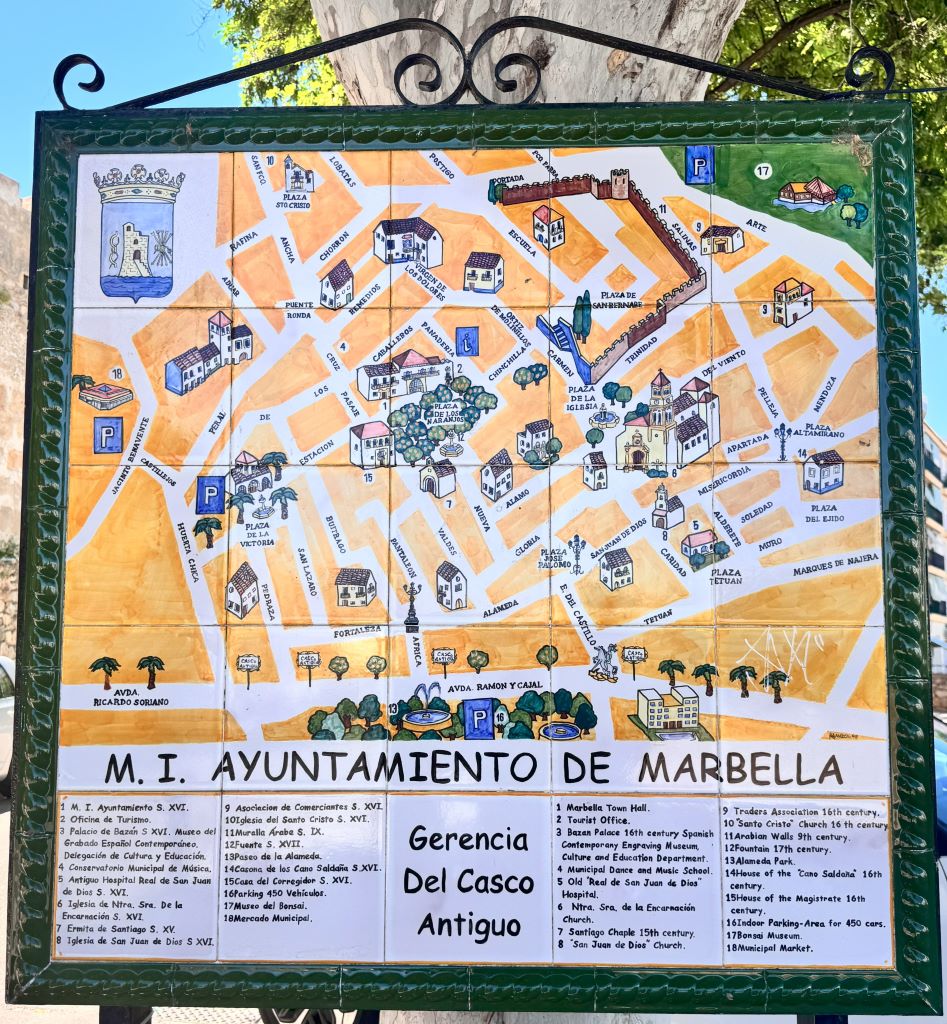
Museo del Grabado
The Museo del Grabado (Engraving Museum) in Marbella is an interesting addition to a visit to Marbella Old Town. It offers art exhibitions of pieces done using engraving, lithography and serigraphy techniques, plus drawing workshops for both adults and kids.
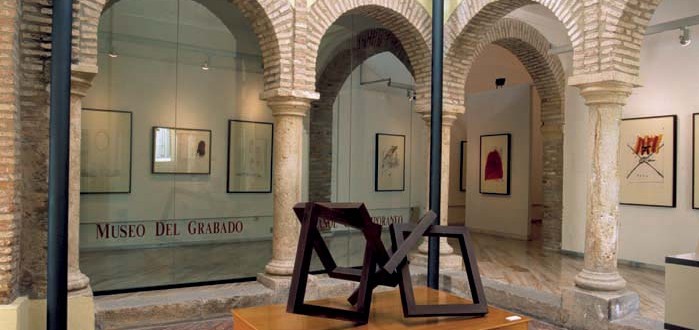
Admission is free of charge and visitation times can be checked on the Museo del Grabado website. As of my visit to Marbella, the Museum is undergoing renovations to expand its area.
Parque de la Represa
The last place I visited on my little trip to Marbella was the Parque de la Represa, a stretch of green that runs perpendicular to Marbella’s main streets and provides a refreshing leisure area to the city. It is right outside the historic center, bordering it.
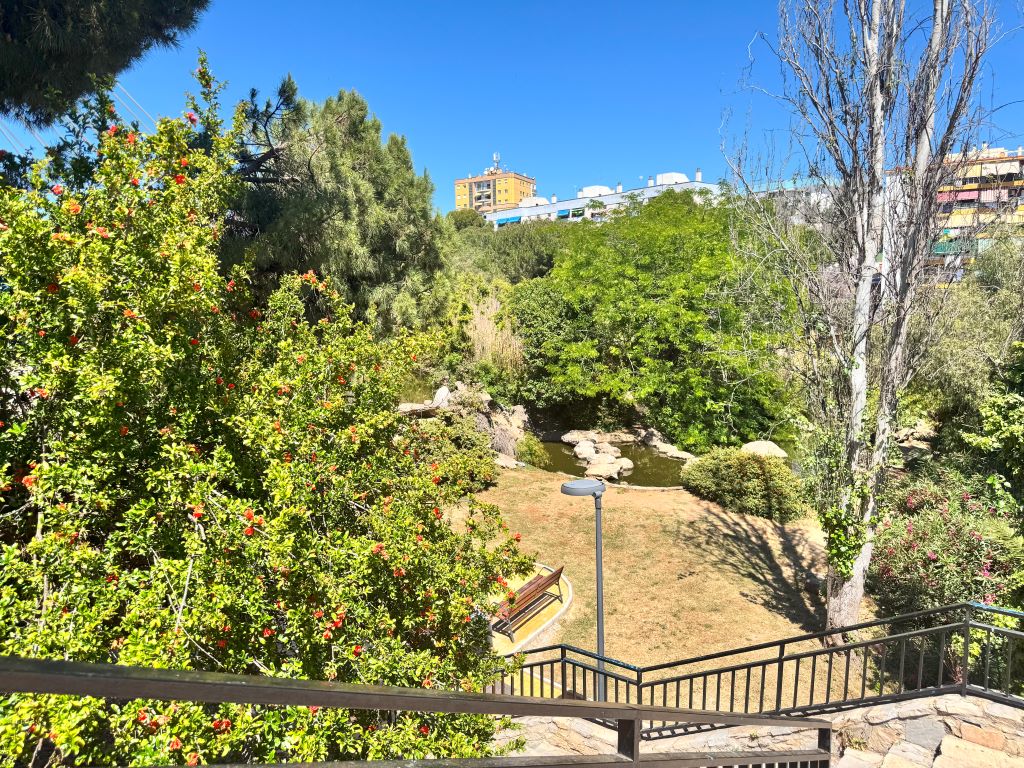
Parque de la Represa is relatively small, though much bigger than the Parque de la Alameda, that we saw at the beginning of this post. The key feature of the Parque de la Represa is that it includes a few urban equipments: it has a library and a large playground, as well as sports courts and a large pond, above which both sides of the park are connected by the Cristo del Amor bridge.
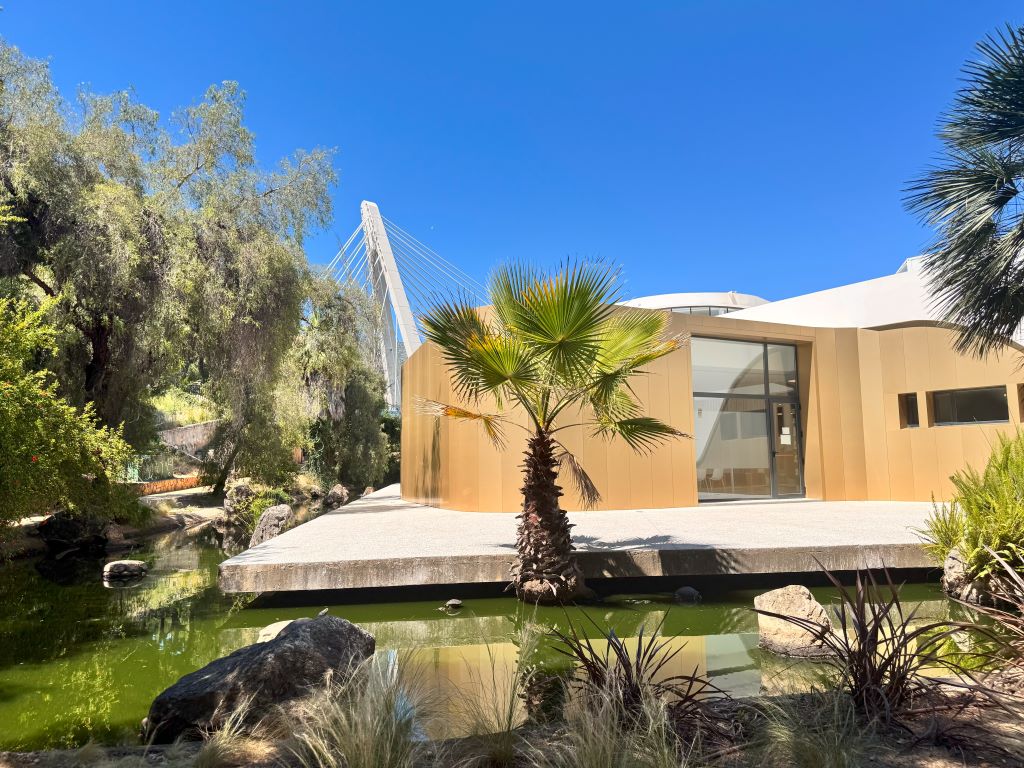
Is it only me or does the Cristo del Amor Bridge looks a lot like the Armada Bridge in Fuengirola’s Sohail? I have no idea which one came first, though. Also in common with Fuengirola – and other parts of the Costa del Sol – I believe this park follows the path of a previous, canalized creek. In the Costa del Sol it is common to channel small rivers and to stablish green areas along its natural path as a way to preserve natural sources of water. The name of this park, that translates as Dam Park, reinforces my suspicion.
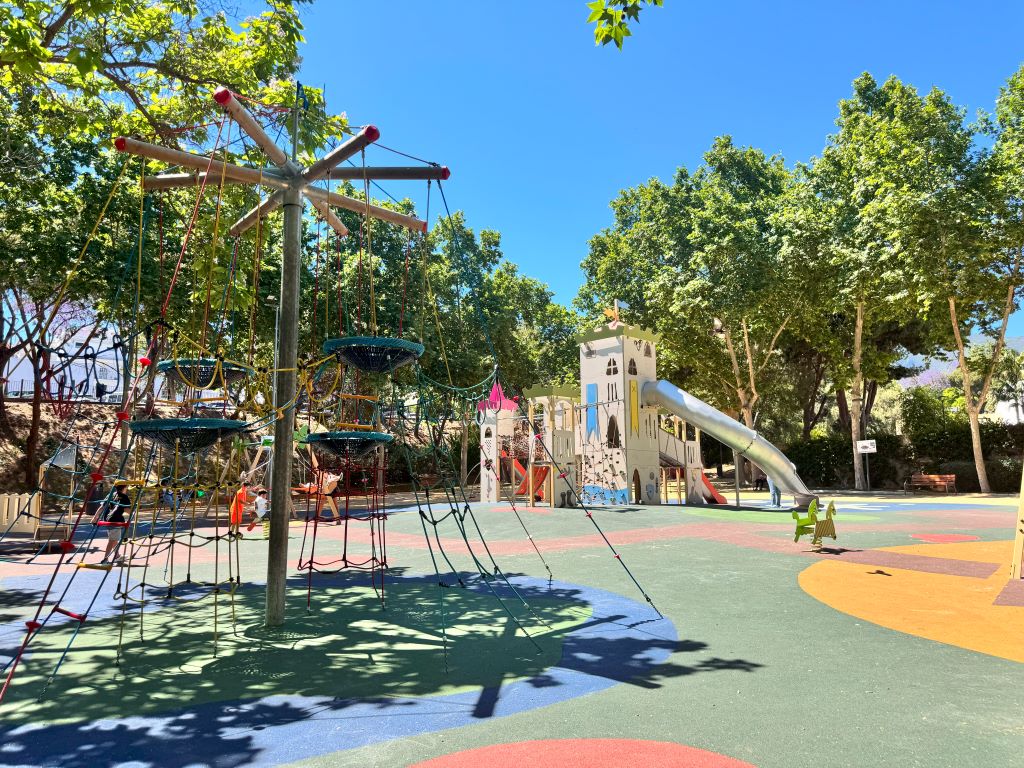
And like in Benalmadena, library and playground are near each other, in a park – a very smart association between reading and leisure!
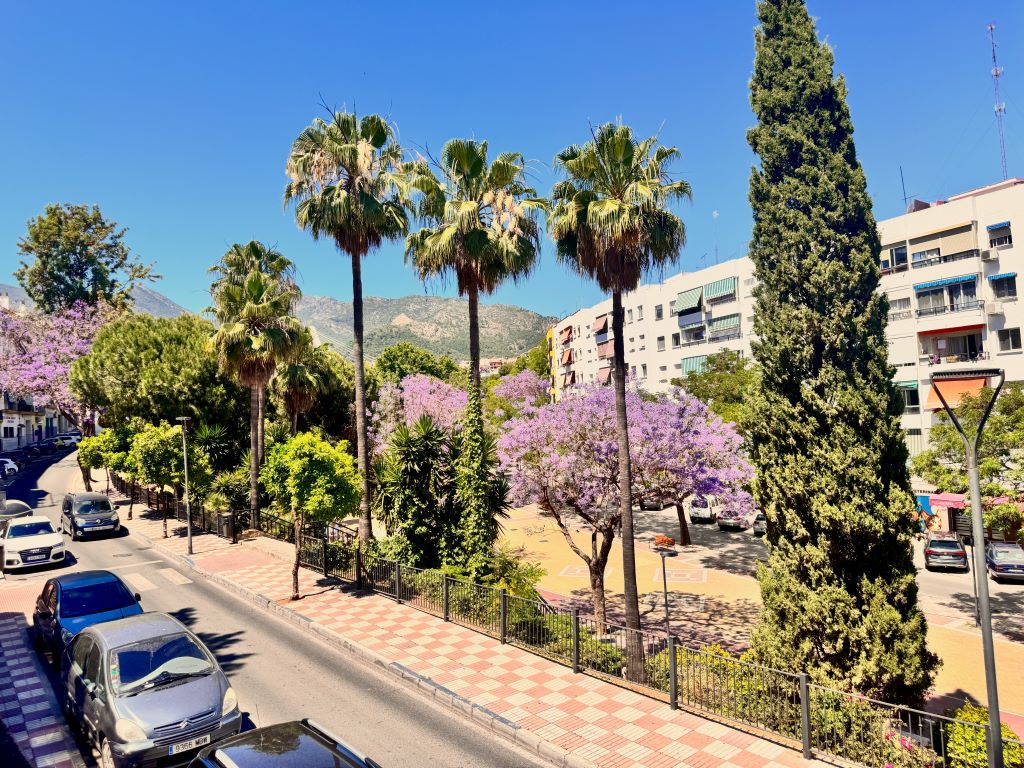
How to get to the historic center of Marbella
Marbella, unfortunately, has no train. I believe most people that live in the Costa del Sol strongly hope someday the train reaches Marbella, and there are plans to do so; the bad news is that those plans are more than 10 years old and nothing ever started. Therefore, for the foreseeable future, the way to reach Marbella Old Town is by bus.
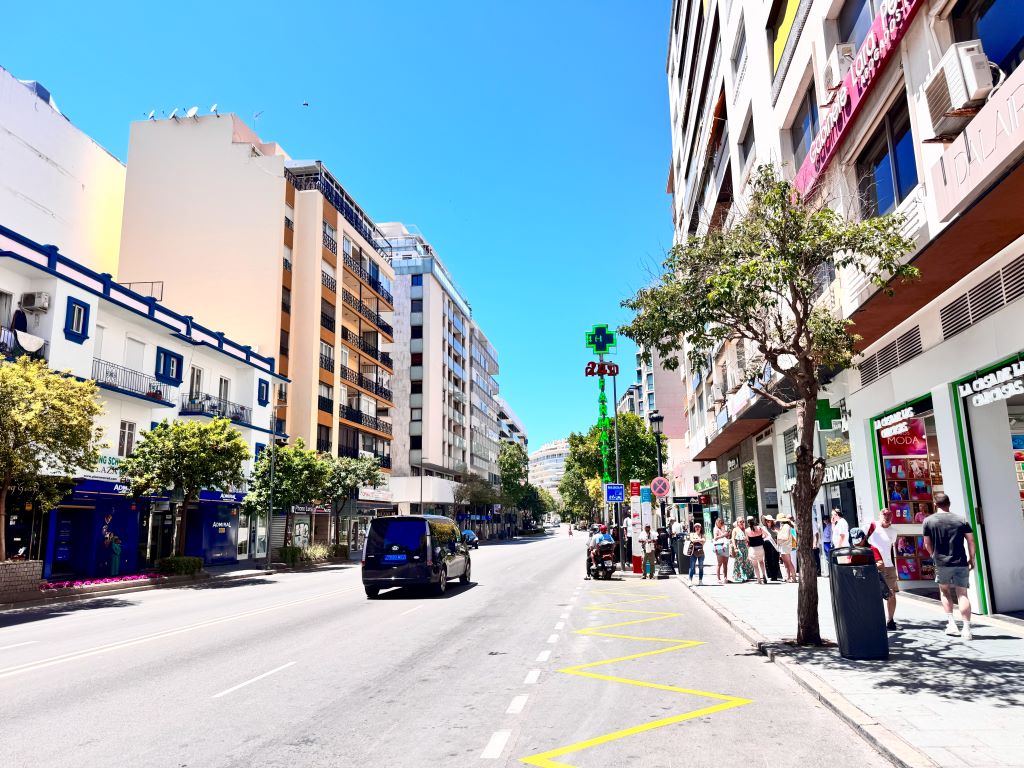
Coming from Malaga, Torremolinos, Benalmadena or Fuengirola, I’d recommend taking the train all the way to Fuengirola Station, then going to Fuengirola’s bus station (a one-minute walk, maybe less) and getting bus the M-220 bus to Ricardo Soriano bus stop, in Marbella. That is what I did, and it took me a bit shorter than two hours to get to Marbella Old Town from Arroyo de la Miel (Benalmadena). The way back home was very similar; the only difference was that I took the M-220 from the other side of the street, from a bus stop called Marbell Center.
Where to stay in Marbella Old Town
Planning to stay in Marbella Old Town? Check available accommodations below! The center of the map marks the Plaza de los Naranjos; the historic center is all very walkable and, in my opinion, very beautiful. Pick your dates and number of people coming; I think you’ll love it!
When to visit Marbella Old Town
In my opinion, the best time to visit Marbella’s historic center is in spring. The weather is nice, the flowers are blooming in strong colors, we have very beautiful days during this time of the year. The absolute best time would be at the beginning of June, when the Feria de Marbella is happening, because then there is the bonus of visiting the Feria.
Autumn is also a good time – and even better than spring if you are allergic to pollen, as the weather in autumn is just as great as in spring – not so hot, not cold at all. There will be less flowers blooming, but there will certainly still be some.
Winter would be my next best pick. You may face some rain and cloudy days, but you will have an easy time moving around – who knows, you may even find a parking spot! – plus the advantage of scaping somewhere really cold, if the winter is harsh where you live. Winter in the Costa del Sol is comparable to autumn (or summer) in much of northern Europe.
Finally, summer, a time I do not recommend visiting neither Marbella Old Town nor any open space in the Costa del Sol. Summer in the Costa del Sol is a time for beach and pool, lots of drinking water, large hats and layers of sunscreen, not to be out in the open doing exercise – it gets way too hot. It would be comfortable to go for a stroll only in the early hours (I’m thinking around 6 am) or at night (which doesn’t start before 10 pm during summer).
Conclusion
Marbella Old Town is beautiful, interesting and full of charm; it is well preserved and super well kept. It has pubs, restaurants and plenty of commerce, besides being situated near the beach and well served by buses. There is a lot to see and to do in this area, and it clearly is a great location from where to explore the other parts of Marbella.
